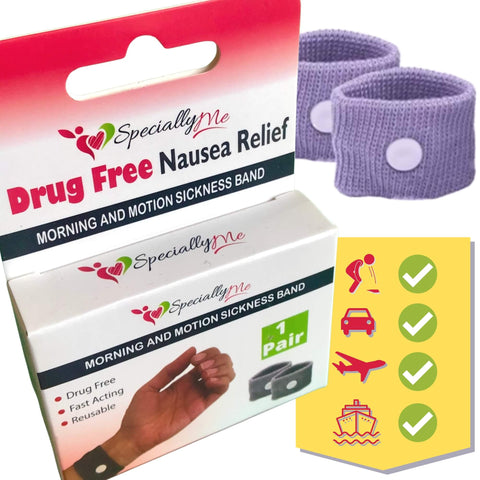Morning Sickness: Causes, Symptoms and Relief
Ladies, that strange feeling we encounter early in our pregnancy is most certainly real and definitely has a name. It’s called Morning Sickness, vomiting of pregnancy or pregnancy sickness.
This article gives you answers to your most common Morning Sickness questions. (read length: approx. 10 minutes)

In this article we will cover:
- What is Morning Sickness? What are the Causes and Symptoms?
- When does Morning Sickness START during pregnancy and how long does it LAST?
- What week is the WORST WEEK for Morning Sickness symptoms?
- Is Morning Sickness a GOOD pregnancy sign?
- Would Morning Sickness AFFECT MY BABY and their development?
- HELP or RELIEF NEEDED NOW? How can I get Morning Sickness relief?
- Morning Sickness BANDS, BRACELETS – THE SCIENCE BEHIND WHY THEY DO WORK
- How SAFE are Morning Sickness drugs, tablets, pills?
- Common Beliefs – Is Morning Sickness worse with baby girls? Twins?
- Morning sickness in MEN – Is this a thing?
| Check out our Ultimate Pregnancy Guide for more information on your Pregnancy |
 |
What is Morning Sickness? What are the Causes and Symptoms?
Morning sickness is a well known and very common symptom of pregnancy that is experienced world-wide by women of all backgrounds and races. It understandably feels like it’s only us going through the torture, but it’s a rite-of-passage for most women, whether you are a first time mom or on your 3rd, 4th of 5th child, it doesn’t matter. Statistics from Cornell University indicate it is common in as many as 70% of women during pregnancy, and additional sources indicate that morning sickness can be experienced by as many as 85% of women during pregnancy.
Morning sickness causes
We would love to tell you the specific cause of morning sickness but the science on this is not conclusive, and there is still no scientifically proven single cause of morning sickness. However, there are confirmed contributory factors. The 2 most common and cited links to morning sickness are firstly, the increased hormone levels experienced by pregnant women in the early stages of pregnancy, especially for first time moms. Secondly, the reduced blood sugar levels encountered also at the early stage of pregnancy.
Typical Morning Sickness Symptoms
Before we jump into the most common morning sickness symptoms, we have to counter a couple myths. Even though it is commonly called morning sickness, it can and does occur in many women all throughout the day and at night as well. Another myth is that all women experience morning sickness. Not so, about 10-20% of women actually do not experience any or only very mild symptoms of morning sickness during their pregnancy. You should also know that we experience morning sickness differently, and many of us will not all display the same symptoms below.
Now onto the common symptoms. The most common symptoms of morning sickness include:
- A nauseous, queasy feeling that is best described as a type of seasickness or carsickness. This queasy feeling is normally felt in the mornings as you awake, but as mentioned, can continue throughout the day or be felt at night as well
- A strong dislike or aversion to certain foods and smells. The scents are very over-powering and they can and do actually make you sick to your stomach, and promote vomiting. Some of us will vomit frequently and all throughout the day, while others may only experience these feelings occasionally, and at specific times in the day
- Bouts of hunger or cravings following the nauseous seasick feeling
- Frequent trips to the bathroom and occasional diarrhea
As mentioned not all women will experience the symptoms above and will likely not experience all of the symptoms outlined.
When does Morning Sickness start during pregnancy and how long does it last?

FIRST TRIMESTER - If you are like the 80% of women who experience morning sickness, you will start feeling nauseous most commonly between the second and sixth week of pregnancy, and would tend to align around when your next period is due. However it is not unheard of to begin seeing symptoms as early as two weeks after conception. This early timeline is possible, but the most common timeline is around when your next period is due. The morning sickness symptoms may either appear gradually, or seem to occur all at once.
Good news though. By the time you approach the second trimester, your symptoms will most likely start to decrease as reported by most women who experience first trimester morning sickness. The typical duration for morning sickness is up to week 11 or 12 of your pregnancy with most women being symptom free by week 14 according to a Healthline cited study. Phew! Yes, it does usually come to an end.
What week is the WORST week for Morning Sickness symptoms?

As mentioned, morning sickness usually starts between your second and sixth week of pregnancy, and most women usually experience the worst effects of nausea and vomiting with diarrhea in some cases, between weeks 8 and 10. Definitely in the first trimester according to Healthline sources.
First-time pregnancy may also be worst in terms of the severity of the symptoms you experience, compared to later pregnancies. This is due to the fact that your first time pregnant body may be less adapted and ready for increased and new hormones, and other changes your body is undergoing. Another contributory factor for first time pregnancy and morning sickness is the increased stress and anxiety levels around the new world of pregnancy.
Bear in mind however that these timelines are based on most common reports and studies and once again each woman is different and may not fall within what is experienced in reported studies.
Is Morning Sickness a good pregnancy sign?

Morning sickness usually gets a bad rap and promotes negative feelings, but there are positives associated with the presence of morning sickness and it’s backed by science.
A recent study published in a JAMA Internal Medicine publication indicates that the presence of morning sickness coincides with a reduced risk of pregnancy loss. This study was based on reviewing data for 800 women, and initial suggestions for the reduced risk of pregnancy loss included the effects of morning sickness leading to less risky actions on the part of women e.g. not consuming alcohol or smoking, However these behavourial changes were scientifically discounted, as this was factored into how the study was administered, leaving the only conclusion that there is a biological link to reduced loss of pregnancy and presence of morning sickness. This conclusion on a link between morning sickness and decreased risk of pregnancy loss was also reached in similar scientific studies
Would Morning Sickness affect my baby and their development?

This is a very understandable and natural question especially for first time moms.
One clear note however is that your baby is healthy and ok even though you are feeling sick and exhibiting symptoms. Since morning sickness is most commonly a first trimester experience, your baby is not yet fully developed requiring a lot of nutritional nourishment, so eating very little due to vomiting is not a problem. Luckily, when your baby does require a lot more nutritional nourishment, you will most likely be over your morning sickness in the second trimester
This is not to say however that you should not be vigilant, and manage any extreme vomiting or morning sickness symptoms. You should continue to monitor your body and urine colour as a health indicator, to ensure it remains clear or light straw coloured. It’s easy to become de-hydrated from prolonged vomiting, and if this is the case, your urine would be much darker in colour, and you should take action immediately to ensure you and your baby remain in the best of health. This is very important. A very small percentage of women, 5% or less, experience extreme symptoms of vomiting several times daily on a prolonged basis. If this is your scenario, we urge you to see your doctor and seek medical advice immediately
Help needed now? How can I get Morning Sickness Relief?

Okay, now all of the causes, symptoms and morning sickness timelines are clear, what on earth can we do to minimise the effects? Firstly, let’s say that there is tremendous evidence that safe, drug free remedies do actually alleviate the symptoms and allow you comfort during your period of morning sickness. We have divided the simple, safe and drug-free remedies into 2 buckets. (1) Habit change (2) Stronger more sustained measures
Habit change
- Drink plenty of water and drink it after and before all meals.
- Try to avoid foods with strong seasonings and spices, especially if this is not your traditional diet or if these foods have a high fat content
- You should also eat smaller portion sizes. Less you are filled the less there is to vomit. However, DO NOT starve yourself
- Sleep more often by taking daily naps.
Just stay away from smells that you notice make you nauseous. More recent ones as well as the smells you always hated
Stronger more sustained measures
- Spend $10 and invest in morning sickness wrist bands – They do work and are safe / drug free – We even offer you a 50% DISCOUNT on a single pair of morning sickness bands SUBSCRIBE BELOW AND GET YOURS HERE
- Interested in the science behind why they work? – SEE BELOW
- Use an anti-nausea Ginger / Lavender / Spear and Peppermint essential oil blend with your diffuser. Shop a great diffuser choice below
- Consult your doctor on the best pre-natal vitamins for you and take your vitamins at night.
#1 Essential Oil Diffuser (Click Image to purchase - AMAZON USA)
Morning Sickness bands, bracelets. The science behind why they do work
CLICK IMAGE TO SEE PRODUCT BENEFITS FOR NAUSEA RELIEF
In summary YES, these small and somewhat inconsequential looking bands do work to relieve nauseous symptoms associated with morning sickness and it’s simply based on the well-known eastern practice of acupressure.
The great part is they are completely re-useable and work over and over again to relieve your symptoms without any potential harmful side-effects you can potentially encounter from taking prescribed medication. The elastic band with the important plastic ball are positioned on your wrist as indicated (Plastic ball is 3 finger-widths away from your wrist) so the plastic ball is positioned over a known acupressure point on your wrist. The is known as the Pericardium 6 pressure point or the Nei Guan point in eastern cultures. Gentle pressure on this point was scientifically proven to provide relief in a 2001 study of 60 pregnant women. This finding was proven even when accounting for the placebo effect and was conclusive. In addition, the women with pressure applied to the Nei Guan points experienced lasting symptom relief as long as 14 days after the test.
So use these bands as often as you like, we recommend one on each wrist, and they are great for general motion sickness or other situations that lead to nausea, even in kids. Shop our Morning Sickness Relief bands below:
How safe are morning sickness drugs, tablets, pills?

DISCLAIMER - Information provided by SpeciallyMe is not meant to suggest a particular medical plan of action. The information is solely intended to inform you, and be a source of education. The responsibility for medical treatment and the best medical plan of action rests with you and your discussion with a qualified medical professional
As previously mentioned even though up to 80% of women experience morning sickness during pregnancy, most cases are manageable with previously outlined safe and drug free steps. There is however approximately 5% of women who experience severe symptoms. In this scenario, we strongly recommend you discuss this condition with your medical professional and review potential prescription drugs that have been approved by your health and medical regulatory agency. Women experiencing severe symptoms have taken vitamin B-6 supplements and other supplements containing various concentrations of ginger and ginger extracts, as well as prescribed medications that are a combination of the two.
Some prescribed medications have caused concerns recently and are apparently linked to increased birth defects including the prevalence of infant heart defects and cleft palate. The American Congress of Obstetricians and Gynecologists (ACOG), has commented on this, and indicate that studies on this link are limited, and the results of current studies are conflicting. We therefore urge you to discuss any severe cases of morning sickness with your medical professional, for the best and most current advice on the medical plan that is appropriate for you
Common Belief – Is Morning Sickness worse with baby girls? Twins?

Not surprisingly there are some common beliefs and sayings around morning sickness, with a very popular one suggesting that morning sickness symptoms are much worse when you are expecting a baby girl or twins. Is this really true? What does the science say?
According to Dr Christine Greves an OB-GYN at Winnie Palmer Hospital for Women and Babies, women who are carrying twins do produce and show higher levels of the pregnancy hormone hCG, and this does often result in a higher prevalence of nausea and vomiting symptoms. However, it is not conclusive to say that more severe symptoms automatically indicate the presence of twins, but there is a correlation between twins and higher levels of hCG and morning sickness symptoms
In relation to whether you are expecting a boy or a girl based on the severity of your symptoms, the jury is still out on this according to Medical news today as scientific studies over the years generated contradictory results. Women do also experience higher levels of hCG when carrying girls, but a 2013 study contradicted an earlier 1999 study, as it more recently showed that women carrying boys actually has demonstrably more cases of morning sickness than those carrying girls.
Morning sickness in men – Is this a thing?

Ladies, ladies, we know pregnancy is a very special time, and the increased hormones running through our bodies along with the nausea and queasiness etc, can make us forget what is happening around us. But we shouldn’t forget the guys, and yes, the weird reactions and feelings going through his body may actually be Male Morning Sickness. It really is a thing in a small percentage of men, especially more emotional and sensitive guys. It is also referred to as couvade or sympathetic pregnancy but the symptoms in guys are slightly different. For guys, the most common symptoms are weight gain, nausea, bloating and changes in mood.
There is not a lot of concrete scientific data and studies on the rates of men affected, but anecdotal evidence places the range of men affected by couvade to be as low as 20% or as high as 80%. Similarly, the causes of male morning sickness are not specifically known. However, there are indications of some causality likely due to decreased in testosterone levels in guys during pregnancy and around child-birth, and more details on this suggestion can be researched on Scientific American
It is a real condition for a noticeable percentage of men so ladies, let remember this fact as well.
There you have it ladies, all you need to know on Morning Sickness. Don't forget to SUBSCRIBE below for more relevant information to help you on your journey.






Well said an informative
So educative